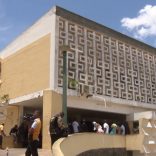Mozambique: Over three million children to be vaccinated against polio in Nampula
Mozambique: Clause used to deny registration to LGBT association declared unconstitutional

File photo / LGBT flag
Mozambique’s Constitutional Council, the highest body in matters of constitutional law, has struck down as unconstitutional a clause in the Law on Associations which had been used as an excuse not to register the country’s sole association of gay, bisexual and transgender citizens, Lambda.
The ombudsman, Jose Abudo, acting on the request of Lambda and a number of other civil society organisations, requested the Constitutional Council to declare the clause unconstitutional. The Council agreed, and in a ruling dated 31 October struck down the clause.
The Council acted with remarkable speed, since the ombudsman’s request was only made in September. The Council ruling at no point mentions Lambda or sexuality, but takes its position solely on the contradiction between the Law on Associations and the Constitution.
The Council based its ruling on Article 52 of the Mozambican Constitution, which states that associations are banned if they are military or paramilitary in nature or if they “promote violence, racism or xenophobia or pursue aims contrary to the law”.
Those who did not wish to register Lambda could not possibly argue that Lambda is violent, paramilitary, racist or pursuing illegal goals, and so they fell back on the clause in the 1991 law on freedom of association which states that associations must rest on “the moral, social and economic order of the country and not offend the rights of third parties or the public good”.
Arguably this was legal at the time, since the 1990 constitution left the regulation of freedom of association in the hands of parliament, which then, in the 1991 law, introduced the vague concepts of “moral order” and not offending “the public good”. It is these concepts which have been used as an excuse not to register Lambda.
But the Council pointed out that the Constitution was amended in 2004, and the section on freedom of association states quite clearly the grounds on which associations may be banned. It says nothing about the “moral order” or “the public good”.
The Constitution also states that the law “may only limit rights, freedoms and guarantees in the cases expressly envisaged in the Constitution”. Hence parliament lost the power which the earlier constitutional text had granted it to regulate freedom of association. As from 2004, only a constitutional amendment, and not any lower type of legislation, could add restrictions to the freedom of association.
The constitution thus did not allow parliament to restrict associations on grounds of “the moral, social and economic order”. No ordinary law can add to the type of limitation on freedom of association expressed in the Constitution.
The offending clause in the 1991 law had thus been tacitly revoked by the 2004 Constitution. Nonetheless the six judges of the Constitutional Council unanimously declared the clause unconstitutional.
Lambda has been struggling for official recognition for almost a decade. Repeated requests to the Ministry of Justice, the body in charge of registering associations, have borne no fruit. Although some of the past Justice Ministers have been prepared to work with Lambda on an informal level, none have agreed to register it.
A Lambda spokesperson told AIM on Thursday that he regarded the Constitutional Council ruling as “a great victory”. He said Lambda would contact the Ministry of Justice yet again, send the Ministry the Council’s ruling and await the Ministry’s response.












Leave a Reply
Be the First to Comment!
You must be logged in to post a comment.
You must be logged in to post a comment.